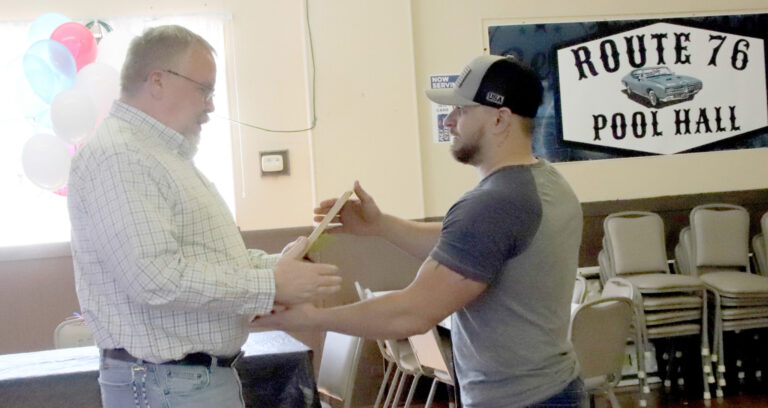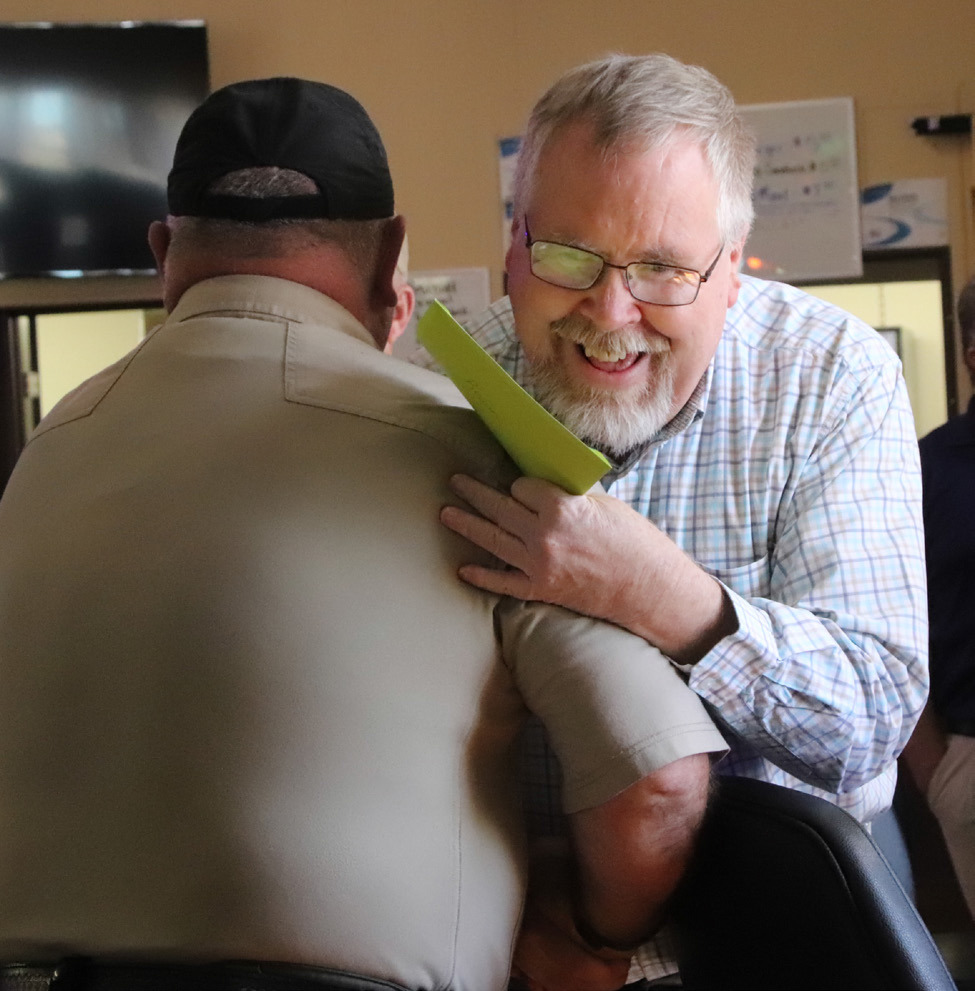Cybercrimes investigator shelves badge


Since 2006, Brian Martin has investigated and imprisoned local, state, national and international criminals whose crimes are considered the worst of the worst, but some of the least visible.
A member of the SWMO Cyber Crime Task Force, Martin’s law enforcement career began in Barry County in 1984 as a part-time deputy, mostly transporting prisoners.
“At the same time, I was working for Monett PD, and I left there to go full-time at Barry County in 1988,” he said. “Jimmy Hopkins was the sheriff and got beat in the election, but Ralph Hendrix was elected and he kept me on for whatever reason, which was not very common back in those days. I was a bit disillusioned and ran for sheriff in 1992, which was a bad year to be a Republican. I think only one got elected around here.
“After that, I went back to Monett, but when Mick Epperly was elected in 1996, I went back to the county. Except for a year in McDonald County helping set up their 911 system, I was an investigator for Mick.” A decade later, Martin began talking with other area and state law enforcement, and at a training, the group conceived the task force and secured its funding.
“We were consistently No. 1 in the state in cyber crimes cases, and our prosecutions were successful,” he said. “I don’t think we ever lost a [federal] case, and they rarely went to trial. The way we put together our cases, there’s just not much they could do. We were initially prosecuting on the state level, but a case we lost was one of mine where the defendant had obvious pictures of child pornography, but the associate judge didn’t think we needed to do such cases and declined to bind it over.”
After that happened, the task force sought out federal assistance.
“We started working closely with the U.S. Marshals in Springfield, and they went to the U.S. attorney’s office to show them the work we did,” Martin said. “They were interested in prosecuting our cases federally, and from then forward, about 90 percent of our cases were done federally. For us, it was a perfect storm. We had lots of good cases, and it was low-hanging fruit for the attorneys. We were in the top three in the country for cases prosecuted under Project Safe childhood. When I first started, we might have had about 200 reports a year. In 2022, we recorded almost 700.”
Martin’s work primarily focused on locating and capturing individuals for creating or trading child pornography, but not all his time was spent in front of a screen.
“We actually bought a couple babies in Joplin, and at another point, prosecuted a guy based in the Philippines actively selling children,” Martin said. “An ICE agent acted as an undercover officer in the Phillippines, and we went to this guy’s compound and purchased a couple kids in cooperation with the Philippine authorities. After that, we raided the compound and rescued over a dozen kids, brought the guy back to the U.S. and prosecuted him. He will never get out of prison.”
From halfway across the world to not even halfway across the county, Martin worked cases everywhere.
“One investigation was a call we got from an appliance store who repossessed a TV set and they found what they believed to be child porn on it,” he said. “That was in the early days of smart TVs. We seized it and investigated, and it turned out to be a guy in Cassville. Some of those photos were created by him.”
That suspect, then-26year-old Matthew Casas, pleaded guilty to two federal counts and was sentenced to 25 years in prison without eligibility for parole.
Of the kidnapping cases the task force worked, Martin said it may seem counterintuitive, but most crimes occurred in rural areas rather than larger metropolitan areas.
“When we’ve investigated actual abductions of kids, we have recovered them all alive. But, none happened in big towns,” he said. “Aurora was the biggest town, and all the rest were in towns smaller or in the middle of nowhere. There was one by Miller and by the time we located her, she was in the boot heel. When the SWAT team kicked in the door, they were literally talking about killing the child and disposing of her in the Mississippi River. And, those people were not visibly scumbags — one was a professional firefighter.”
In other instances, individuals traveled to the area with the intent to commit sex crimes, and some of those were extremely violent.
“There was not a lot of time to proactively work chat cases at the end, but when we did, we did not have to do much to entice them to travel,” Martin said. “One of the first we did of those, we took over the account of a 12-yearold and eight hours later had a guy in Tulsa willing to meet in Jasper County. When he showed up, we sent in the SWAT Team, and he had a 9 millimeter in the vehicle, a rope kit, ligatures, gags, sex toys — everything he needed to do whatever he wanted. Nobody would have known.
“Some of these guys are really dangerous, and people playing vigilante may not realize that. When we arrested him, we found out he was the prime suspect in the abduction and murder of a couple kids in Oklahoma. We dealt with another criminal whom I believe was a serial killer and was also sexually exploiting kids, including a police officer’s kid.”
Dealing with such a wide variety of criminals and victims was a challenge at time, Martin said, and there was no prototype pedophile.
“Sometimes, you do hate the world,” he said. “When I first started in law enforcement, it was more stressful because I knew the victims. This was easier in a way because I was able to compartmentalize the pictures. But, ultimately, no one wants to work in child crimes.
“We’ve arrested attorneys, an OBGYN from Tulsa who traveled for sex with a 14-year-old, cops, firemen, teachers, preachers and the vice president of a school board — people you go to church with, meetings, ball games and would never guess they did stuff like that,” he said. “The prototype is the exception, not the rule.
“When I left, I passed on a case with victims in Switzerland, Denmark, Ethiopia, Ireland and the USA, and there was still forensics to be done on some devices. This was a truck driver in a small town who ran several child porn groups from his truck and had kidnapped and raped at least three women.”
Martin said the Task Force is necessary because the resources needed to track, locate and arrest cybercriminals are not available to all.
“Cases like [the trucker] are not always workable for local police because it takes a lot of resources,” Martin said. “Hopefully, that work will continue on. We could have been doing twice the number of investigations if the funding was there, but the state, for whatever reason, chose not to. We have the same funding now as when we started in 2006, and it’s incredibly expensive to get the technology we need to do our jobs.”
On of Martin’s major goals during his 17 years of cybercrimes work was to educate parents and prevent the possibility of crime by removing or limiting the technology at children’s disposal.
“First of all, if you give a kid carte blanche access to the internet with no supervision, you may as well give them a loaded .38, because the outcome is the same,” he said. “Parents need to be parents and know who their kids are talking to. And kids don’t need computers in their bedrooms.”
Many times, the avenue pedophiles may use is not one on a parent’s radar.
“We worked a kidnapping in Polk County facilitated by online chats, and the mom said there was no way because they didn’t have internet,” he said. “But, her daughter had a Blackberry, which was state of the art at that time, and was talking to a child predator.”
Ultimately, parents have to have control and access to all their child’s online activity to remain safe.
“Computers are a double- edged sword — on one side, they are great, and on the other, they are purely evil,” he said. “One upon a time, pedophiles had to know someone to make or trade child pornography, or order the plain manilla envelope from the Netherlands and hope the postal inspection didn’t catch it and get them arrested. Now, people can get whatever they want.”
If something does happen, Martin said a way parents may know is if there is a major behavioral change in the child.
“Look for certain behaviors,” he said. “Like when a child has a radical change, something is probably going on. Kids have all the friends they need at school. God gave us parents because kids can’t take care of themselves.”
That can be tough, as Martin admitted even children often say less than a perpetrator will in an interview.
“More often than not, you find out more from interviewing the perp than you do from what the kids disclose,” he said. “We had a really high confession rate.”
As he steps away from law enforcement, Martin said so much has changed in his nearly four decades on the job.
“Southwest Missouri is a great place to be a cop, but it wasn’t like that 20 years ago,” he said. “When I started, they gave me a radio and a map of the county. The vehicle, gas, equipment, everything and everything else was on me.
“We’d work five or six days a week, then go home and pray you get to stay home for a bit. Many times, we had to respond to calls in the middle of the night on our days off.”
Martin also lauded the new jail construction, saying a state-of-the-art facility built by a contractor that understands jail design will greatly help the county.
“I’m glad they are getting a new jail,” he said. “When I first started, we had six regular cells one cell for females and a drunk tank. At one time, we had five people in jail for murder and no bed space. Then, they built a shopping center and called it a jail, but it was anything but escape-proof.”
The Southwest Missouri Cyber Crime Task Force is responsible for investigating technology related offenses, involving children as victims, for 22 southwest Missouri counties. These counties include Barry, Barton, Benton, Cedar, Christian, Dade, Douglas, Greene, Hickory, Howell, Jasper, Lawrence, McDonald, Newton, Ozark, Polk, St. Clair, Stone, Taney, Vernon, Webster and Wright.
In 2022, the Task Force opened 1,113 cases. Included in those reports were 696 cyber tips being assigned from the National Center for Missing and Exploited Children. A total of 747 cases were closed in 2022.
During 2022, Task Force investigations lead to a total of 2,178 children being identified as victims, with 59 child victims coming from the southwest Missouri area. The Task Force executed 260 search warrants and caused 358 investigative subpoenas to be issued last year. As a result of these investigations, 56 southwest Missouri offenders were arrested. The Task Force has numerous cases which continue to be in a holding status, due to a large backlog of cases in both state and federal courts.
Computer forensic examiners conducted examinations on 553 cell phones and 136 computers, which resulted in more than 175 terabytes of data being analyzed in support of investigations.
The Task Force also conducted 18 in-person internet safety presentations to more than 2,976 Missouri residents.


